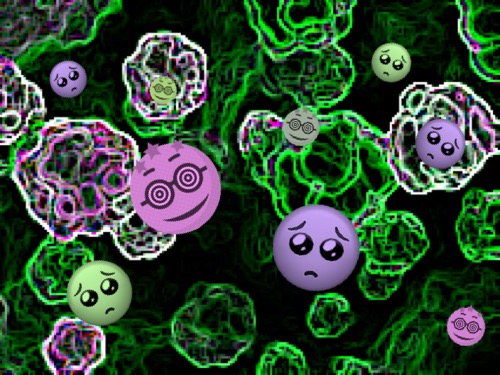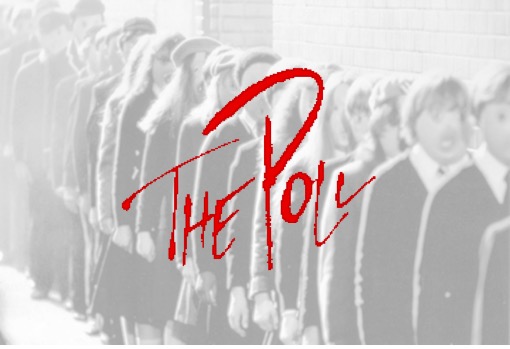Christians Must Face the Primal Digital Politics of Identity

The surge of attention around the Catholic University debate between Sohrab Ahmari and David French, and the ebb that followed, mirrored the reaction to a recent and similarly hot ticket: Jordan Peterson versus Slavoj Žižek.
That debate, which pitted capitalism against socialism, and/or Jung against Lacan, packed the house full of youngish intellectuals desperate for someone, anyone, to notch a clean, distinct win—to demonstrate that such a thing in today’s smeary environment was possible.
After both disputants agreed that disaster was probably around the corner and there was probably nothing we could do about it—with the implied caveat that at least the two of them could continue to get paid talking about it—the vital if nervous energy that suffused the room and the souls within was let out with a sad fart, and the queasy feeling that all potential victories and foundations had been smeared away returned.
Similarly, the upshot of the Ahmari-French debate appears to be a vaguely disgusted sense that we remain stuck at aporia in the Western conflict between communitarianism versus individualism, conservatism versus liberalism, Whig versus Continental philosophy, or whatever you want to call it.
The real underlying feeling is that Western political philosophy has sat so long at this impasse that it has become a dead end. Civility and community have become enemies now, and no resource internal to the Western tradition of political thought can locate a ground, procedure, rhetoric, or game that might unite them.
Which is likely why, even if the disputants would demur, it is so tempting to view not just the fundamental contention between Ahmari and French to be a matter of inter-theological disagreement but to view the entire Western problem that way. Liberal proceduralism has failed because Protestantism has failed. Integralism is oppressive because Catholicism is oppressive.
Of course, this frame of mind does not rule out—and possibly demands—the conclusion that we are therefore stuck both with our past failures and new oppressions to come.
But why get ahead of ourselves? The elephant in the room—of the French-Ahmari debate, of the broader debate on the Right, and of the conflicts playing out in the U.S. and across the West—is that today’s agita does not have to do fundamentally with Christianity. What has millions drastically reconsidering their approach to the politics of public life is not a set of Christian disagreements about sin and virtue, but something much more primal and merely natural.
It has always been the case in the West that ordinary people as well as geniuses have wrestled with the unpleasant fact that our fellow humans are often disgusting, depressing, and difficult to be around. But in the new context of today’s mercilessly conquering digital conditions, this familiar psychological and social struggle has changed its character.
My strong sense is that the nature of this change has to do with how life on the internet trains you to see yourself as an utterly inessential instantiation of a completely tired subgroup. Even or especially amid your most incredibly frantic protestations and performances of pride, your increasingly accurate perception is that your identity is inescapably enslaved to the identity of a trivial, exhausted, and in some fundamental sense existentially compromised group.
It’s not that your identity is not still in some way unique; it’s that uniqueness is no longer any protection against comprehensive disenchantment.
The Rise of the Polycule
And yet this smearing away of your own justification for bothering to be is not in most cases unto death. Yes “deaths of despair” are on the rise, but the real trend is lives of despair, lives propped up by the use of various chemicals to induce a kind of artificial pleasure behind which, barely held at bay, is the howling abyss. The life styles layered over this way of life vary as vibrantly as the colors of a dreamcoat, but the technique is the same: acting out one’s identity, whatever it may be, is just a last-ditch effort to get you out of bed in the morning, into the company of people whose identity constitutes a sort of (not at all necessarily sexual) polycule—a self-created super-self that is concrete enough in your perception to shore up your psyche. This pooled personal identity gets its psychic weight from the intimate sense of solidarity and shared dependency behind it—sufficient, despite anything more formal, to help paper over the unnerving smudge where a personal answer to “why bother being?” used to be (if it ever was).
If I’m right, the community-versus-individual framing that defined political philosophy in the terminally pre-digital age is gone—over, not coherent, obsolete. People are trying to work out a different solution to the crushing circumstance Tocqueville described of being thrown back in isolation upon the meager resources of the blooding heart. The politics of identity today is defined by people trying to create post-familial polycules that neither amount to communities in the old sense nor make whole and autonomous their individual selves.
Here comes the key point: amid such a milieu, the experience of being stuck around others’ polycules is getting simply unbearable. It’s painfully evident you can’t just include or be included into other super-selves as a matter of will or imagination, no matter how vein-poppingly hard the culture’s ethics cops strain to meme you into believing and acting otherwise. So too is it agonizingly clear, at the immediate level of percept, and then at the higher level of concept, that the neurasthenic retreat into the culture of the super-self is fairly repulsive and feels shameful even when it is your own super-self you’re bathing in. So, increasingly, the super-selves of others characteristically strike us as radically perverse, decadent, decaying, diseased—against life.
When, against that background, some seem bent on making the best possible go of their particular style of decadence and decay, these instances are apt to pop out in the perceptions of people straining to make a last college try of keeping decadence and decay at bay—resisting the call of the polycule with its strangely inverted pride. Take that as a sociological, not ideological, answer to why all the jabber around which-way-conservatism has been triggered merely by library story time in drag. Parallel reverberations through “the discourse” are touched off by other identities proliferating polycules of their own: “incels,” “neckbeards,” and “reply guys” on the XY end, “wine moms,” “nice white lady terrorists,” and “VSCO girls” on the XX. Myriad polycules are now everywhere, causing nonmembers to recoil out of primal instinct of preservation.
The important thing to observe is this reaction of resistance is not a particularly Christian mode of living and thinking; although it does in some ways overlap with Christian commitments and sensibilities, the overlaps seem to be the decreasingly important factor today. It seems to me what’s happening is people who fear deeply for human vitality (including their own) are expressing outrage in its name against what they perceive to be its mangling by networks of identitarian polycules.
This aspect of our experience seems to me new to the digital age, unlike the identity politics that came before. I suspect its features and its dynamic lurk at the heart of what Ahmari and French and their broader movements and probably disputants across the whole West are anxiously debating about. New social structures are arising that strike adherents to the old as hostile to human flourishing on an even deeper and wider level than sin, even if what they are anxious about is also often considered sin on Christian terms. But sin must be understood in a context of impurity and redemption, and what I am describing is felt reflexively in the context of infection and contagion: toxicity, not fallenness. Instead of closing distances in the name of Christ, the instinct is to widen them for nature’s sake.
“I want drag queens to come into a relation with Jesus Christ.” French argued. “I am not going to usurp the Constitution to do this.” But the sensibility formed in the digital dynamic doesn’t seek to convert members of toxic polycules by any means, Constitutional or otherwise. It seeks to quarantine them.
An Exhortation
It is hard to see how any debate, especially on terms that elide the heart of the matter, can possibly resolve something so elemental. I’d suggest this is the matter that Peterson and Žižek too both failed to secure a clean win around, whether against one another or even “just” the monstrous rotting elephantine entity looming and oozing down on them.
So the situation appears to be that neither Christians nor post-Christians are putting the matter to their increasingly desperate audiences in a way that leads them intelligibly toward any kind of firm resolution. Those resistant to polycule life fear their personhood and their social structures will continue to smudge away unless some champions can show they grasp the nature of the problem and see through to an effective response.
I have some provisional and hopefully not-so-provisional things to say and do in response to this intolerable situation.
But the first of them is an exhortation. We have to understand that today’s technological environment is forming our psyches and souls to make questions of human nature even more important to politics than questions of the nature of God. The dominant issue today is not the political upshot of the difference between the human and the divine. It’s the upshot of the difference between the human and the digital.
Our fellow American humans are crying out for a new elite that evinces a full understanding of this earthshaking new reality. The arguments of those who fail to make that demonstration will be without authority and without legitimacy, and the people will increasingly take matters into their own hands in an inauspicious state of mind.
The American Mind presents a range of perspectives. Views are writers’ own and do not necessarily represent those of The Claremont Institute.
The American Mind is a publication of the Claremont Institute, a non-profit 501(c)(3) organization, dedicated to restoring the principles of the American Founding to their rightful, preeminent authority in our national life. Interested in supporting our work? Gifts to the Claremont Institute are tax-deductible.
Does politics have an answer to digital disenchantment?
The case of CNN.
Voters are growing sick of being sold as news.
Every nation is shaped by its canon. It’s time to shape America’s.






